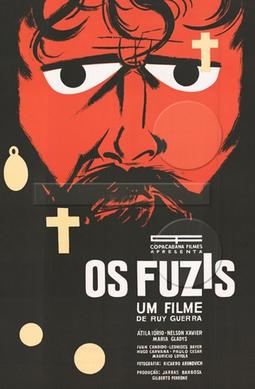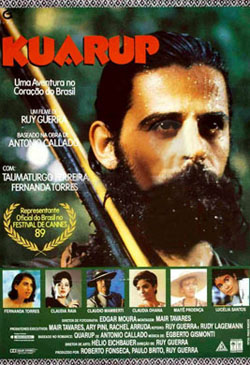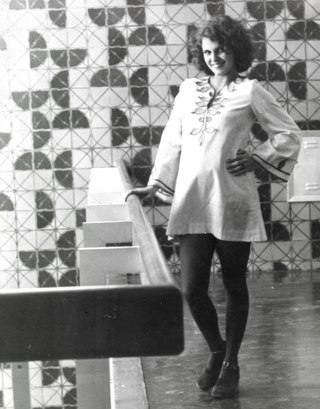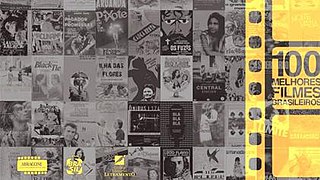Miguel Torres de Andrade was an internationally known Brazilian writer and actor.

Norma Aparecida Almeida Pinto Guimarães d'Áurea Bengell was a Brazilian film, stage and television actress, singer-songwriter, screenwriter and director. She appeared in several episodes of T.H.E. Cat, the first being in 1966 episode “To Kill a Priest”.

The Guns is a 1964 Brazilian-Argentine drama film directed by Ruy Guerra.

Ruy Alexandre Guerra Coelho Pereira is a Portuguese-Brazilian film director and screenwriter. Guerra was born a Portuguese citizen in Lourenço Marques in Mozambique, when it was still a Portuguese colony.

Odete Lara was a Brazilian film actress. She appeared in 37 films between 1954 and 1994, including two films shown at the Cannes Film Festival. In 1957 she was awarded with Prêmio Saci.

Kuarup is a 1989 Brazilian drama film directed by Ruy Guerra. It was filmed at the Xingu National Park, Mato Grosso, and in Recife, Pernambuco.

Turbulence is a 2000 drama film directed by Ruy Guerra. A co-production between Brazil, Cuba, and Portugal, it was shot in Rio de Janeiro and Havana.

João Carlos Daniel Filho, best known as Daniel Filho, is a Brazilian film producer, director, actor, and screenwriter. He starred in the 1962 film The Unscrupulous Ones, which was entered into the 12th Berlin International Film Festival.

Glauce Rocha was a Brazilian actress. She appeared in 34 films and television shows between 1950 and 1971. She starred in the film Os Cafajestes, which was entered into the 12th Berlin International Film Festival.

The 14th annual Berlin International Film Festival was held from 26 June to 7 July 1964.

Nelson Agostini Xavier was a Brazilian actor. He appeared in more than 95 films and television shows between 1959 and 2017. He starred in the 1964 film Os Fuzis, which won the Silver Bear Extraordinary Jury Prize at the 14th Berlin International Film Festival.
Of Gods and the Undead is a 1970 Brazilian drama film directed by Ruy Guerra. It was entered into the 20th Berlin International Film Festival.

The 28th annual Berlin International Film Festival was held from 22 February to 5 March 1978. Director Wolf Donner successfully managed to shift the festival's date from June to February, a change which has remained ever since. This was the first year the festival was held in February. The festival opened with Opening Night by John Cassavetes and closed with Steven Spielberg's out of competition film Close Encounters of the Third Kind.
A Queda is a 1976 Brazilian drama film directed by Ruy Guerra and Nelson Xavier. It was entered into the 28th Berlin International Film Festival, where it won the Silver Bear - Special Jury Prize.

Leila Roque Diniz was a Brazilian television, film and stage actress, whose liberal ideas and attitudes about sex had raised the discontent of both the feminists and the Brazilian military government of the 1960s.
The Beggars is a 1962 Brazilian drama film directed by Flávio Migliaccio. It was entered into the 3rd Moscow International Film Festival.
Portugal S.A. is a 2004 Portuguese drama film directed by Ruy Guerra. It was entered into the 26th Moscow International Film Festival.

José Mayer Drumond is a Brazilian former actor.

Fábio de Souza Lago is a Brazilian actor, best known for his works in Elite Squad, Caras & Bocas, and Invisible City.

In 2015, the Brazilian Film Critics Association (Abraccine) published a list with the 100 best Brazilian films ever according to the votes of its members. This poll was the basis for a book named The 100 Best Brazilian Films, published in 2016. The idea of the ranking and the book was suggested by publisher Letramento, with whom Abraccine and television network Canal Brasil co-released the book. The ranking was done based on individual lists done by Abraccine's 100 critics, who initially mentioned 379 films. The full list was first made available to the public on 26 November 2015, and the book was released on 1 September 2016.















